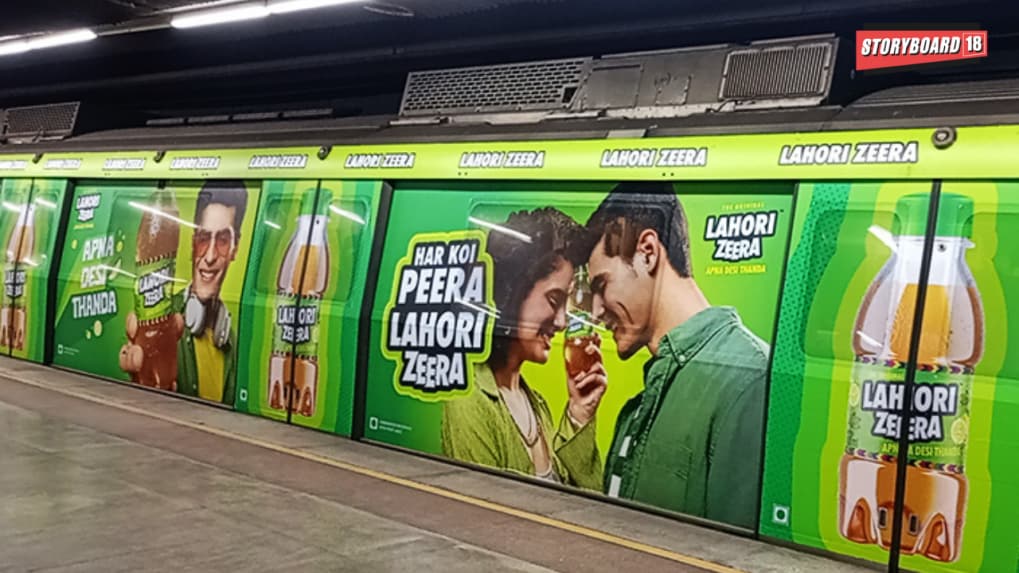From Word-of-Mouth to Metro Wraps: How Lahori Zeera built a national brand
The Lahori Zeera metro rail wrap campaign in Delhi, covering the busiest blue and yellow lines, cost Rs 25–30 lakh per month for 5–6 months.
ADVERTISEMENT
India’s beverage landscape is witnessing a transformation, with consumers increasingly exploring ethnic and functional drinks beyond conventional offerings. Lahori Zeera has leveraged this shift, growing from a niche northern brand into a national player while maintaining a strong cultural and taste-driven connect.
"For the first four to five years, we relied entirely on word-of-mouth and consumer engagement. We did started spending on advertising after we reached Rs 300 crore in revenue. It was only when legacy players like Coca-Cola, Parle Agro and Bisleri entered the ethnic beverages space that we decided to fortify our positioning," Nikhil Doda, co-founder and COO, Lahori Zeera told Storyboard18.
Doda explained that the company now invests in high-impact, selective campaigns instead of widespread spending. Their metro rail wrap campaign in Delhi, covering the busiest blue and yellow lines, cost approximately Rs 25–30 lakh per month for 5–6 months, but drove immense consumer engagement. “Consumers wrote emails, tagged us online, feeling proud that was the real impact,” he said. The company spent Rs 15 crore, which was 3% of the revenue, on advertising in FY25. In FY26, it has planned to spend 2–3% of revenue on advertising and forecasts a revenue of Rs 800 crore.
The global beverages market is projected to generate $1.52 billion in revenue in 2025, with an expected CAGR of 11.68%, reaching a projected market volume of $2.64 billion by 2030, as per a report by Statista. The number of users in the beverages market is expected to reach 180.5 million by 2030, with user penetration at 13.6% in 2025, gradually declining to 12.6% by 2030.
Lahori Zeera is primarily a general trade-driven brand, with 97–98% of revenues coming from this channel. While quick commerce and e-commerce are growing in Tier 1 cities, Doda said, “India largely lives beyond Tier 2 cities. GT penetration is still our core strength.” In North India, the brand reaches even small towns. However, expansion outside the North now accounts for 40–45% of revenues, with South India launches planned for Andhra Pradesh and Telangana next summer.
Zeera remains the flagship flavor, contributing 87–88% of the portfolio, while other variants like Lahori Nimbu, Shikanji and Masala Cola are limited due to production constraints. Lahori Zeera has started offering larger SKUs, including a 2-liter bottle priced at Rs 80. Seasonal demand peaks in summer months (H1), contributing 55–60% of annual revenues.
From ‘Lahore Namak’ to Nostalgia
Doda said that the brand’s name was chosen for its deep food and cultural associations, not political connotations. “When we started, the idea was to do something rooted in ethnic beverages with a traditional touch. Lahore, known for food and nostalgia, felt like a natural choice. The name connected instantly with people. 'Lahore' was selected because of its rich legacy in food and the nostalgic connection it evokes in North India, particularly in Delhi and Punjab. Another reason was the use of black salt, commonly known as 'Lahore Namak', which is a key ingredient of our drink," he added.
Addressing concerns about potential backlash, Doda admitted that the team anticipated criticism when India-Pakistan tensions flared during Operation Sindoor. However, the reality was different. “There were only a few negative posts online, but thousands of people came forward to defend the brand. It was mesmerizing to see the general public stand up for us,” he recalled.
Far from being a challenge, Doda believes the name has strengthened consumer connection across communities. He said Lahori Zeera is even served as 'prasad' in temples, gurudwaras, and Jain religious events. “The product has transcended communities and connotations. People associate it with taste and tradition, not politics,” he said.
As the brand expands beyond North India, Doda noted that in cities like Mumbai or Bengaluru, consumers are less concerned with the name’s origins and more drawn to the drink’s flavor and identity. “Ultimately, the taste and brand personality carry us forward,” he added.
Doda highlighted the importance of taste in building loyalty. “Replicating taste in F&B is not really possible. Other brands’ jeera drinks feel synthetic, cola-based. Our product feels like it’s made at home with natural ingredients.”
Read More: Retail rules, Q-comm bubbles: Cola Wars heat up as brands tap digital playbooks
Read More: Pepsi vs. Coca-Cola: Will the 2025 cola war spark enough buzz?


